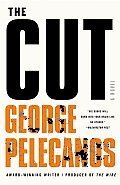Weston Cutter's Blog, page 28
October 3, 2011
Catch Up Part Whatever
Yes, this is lame and obnoxious, but I'm doing it: here's microreviews for five books which I've read in the last 8+ months and have been meaning to review and there's just not enough time, period. The candle flickers, the minutes speed by and it's September's end and these books deserve more than brief mention here but this will have to for now do. I'm really, really hoping that after putting these to bed and my backlog's clear, I can get ahead with just full-on reviewing again (plus all the music! the new Blind Pilot! the new AA Bondy! the new Peter Wolf Crier! Buckner! Jayhawks! Holland! Jaffe! The mind positively reels).
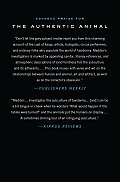 The Authentic Animal by Dave Madden
The Authentic Animal by Dave Madden
First: Madden's an absolute bad-ass as a narrative guide: dude's open in the book's first pages that he has no logical reason to be drawn to taxidermy, yet here he is, not just drawn but now having written the best (only?) book on the history and art and weird impulses that lead to preserving dead animals in life-like forms. The through-current here is a history of Carl Akeley, the grandfather of taxidermy, and The Authentic Animal'd be worth if it if it were just Madden giving the Akeley bio. Instead, it's this rich, very personal, very individual story about the urges to collect and display, and a surprisingly deep consideration of what authenticity means. It's really a hell of a good read.
Bringing the Shovel Down by Ross Gay
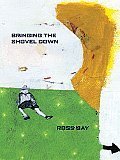
I am a total asshole. I've had this book for I don't know how long now, at least 6 months, and read it right on its arrival and loved it, thought then and still think it's one of this year's top 4 or 5 collections of poetry (Christ! I've had the book even longer: this thing came out in January!), and now here we are, woefully late. Gay's poetry is fiercely amazing, and Bringing the Shovel Down is necessary reading if only for the trio of love poems ("Love, You Got Me Good," "Love, I'm Done with You," "Love, Here's the Deal"), but of course there's bigger and more ocean out beyond those: there's alive music and there are odes and there's everywhere this enthusiastic joy-seeking heart and eye set of Gay's. The book's magic. Should be in any year-end list.
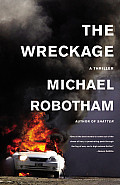 The Wreckage by Michael Robotham
The Wreckage by Michael Robotham
Let's all raise a glass to how awesome thrillers are, and let's keep the glass raised for those of us who have and are still coming late to the party. Robotham's Wreckage is a fun-as-hell, multi-thread story involving the rebuilding Iraq and the secret pathways of money. Meaning, of course, it's about how the world we live in is daily built by forces we're suspiciously aware of at best. Be aware: this book's on the dense end of things—it's a thriller, sure, but it winds thickly through scenes, slowing it here and there—not that that makes it any less worth reading, though.
The Idea of America by Gordon Wood
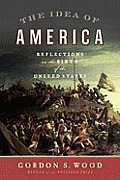
2011′s blessedly not an election year, but I imagine most of us are already tired/frustrated with elected officials at present. Here's the solution for your headache after listening to platitudes about what is or is not America, or American, all those ringingly empty li(n)es about who we are or should be: read Wood's essays on the revolution. Read and be amazed and reminded that America's stranger and more amazing than any pithy campaign point can possibly encapsulate.
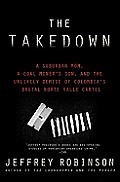 The Takedown by Jeffrey Robinson
The Takedown by Jeffrey Robinson
On page 18 of this book a woman's described as being a vociferous reader, and that's when I got up and came into the kitchen and moaned to my wife about the frustration when good stories get bogged down in over-excited, too-hot prose that doesn't make sense. Look up the definiton of vociferous if you're not clear, but trust me: the woman being described wasn't being pegged as someone who enthusiastically read aloud. That's the shit side of The Takedown: it's too pulpy, and the sacrifices made for the sake of its pulpiness come in the form of corner-cut sentences, stuff that's obviously being cranked down to elicit more oomph. If you can get past that sort of reading experience, The Takedown's fantasitc, a gripping story of a huge cartel's, well, takedown. Just don't write like Robinson after you've finished.








September 30, 2011
Giving Away Chapbooks, Skating + Reading DC
Yes: still blogging at Kenyon Review—another month—and recent stuff's here to go check out. Also: recent work just went live at Scythe, which is a place I didn't know enough about before but hot damn do they do great stuff.
 Along that line: I was finalisted yet again in a chapbook contest. This is, of course, cool, and I'm excited, and sure would've loved to have been the picked winner. Still: great. Burnside's amazing. I did get to thinking, though, that it seems silly that I've got all these poems and books and etc., and they're all sitting on my own hard drive, doing no one any good. So: you can now download a pdf of a chapbook of mine right here. It's called Scarcity Models vs the Heart's Brick Factory. I'm literally just putting it here because it's not in any contests right now and I'm tired of having stuff almost but not quite out for whatever. To the right you'll see the first image result if you enter the chap's title on Google. Download it if you'd like. Pass it around. Enjoy. Now, some reviews.
Along that line: I was finalisted yet again in a chapbook contest. This is, of course, cool, and I'm excited, and sure would've loved to have been the picked winner. Still: great. Burnside's amazing. I did get to thinking, though, that it seems silly that I've got all these poems and books and etc., and they're all sitting on my own hard drive, doing no one any good. So: you can now download a pdf of a chapbook of mine right here. It's called Scarcity Models vs the Heart's Brick Factory. I'm literally just putting it here because it's not in any contests right now and I'm tired of having stuff almost but not quite out for whatever. To the right you'll see the first image result if you enter the chap's title on Google. Download it if you'd like. Pass it around. Enjoy. Now, some reviews.
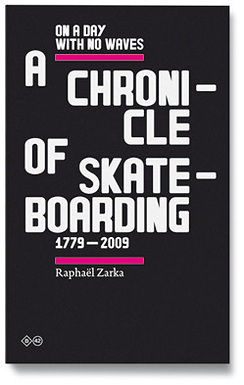 On a Day With No Waves by Raphael Zarka
On a Day With No Waves by Raphael Zarka
Because I've got a good + strident friend who's deeply and life-long into skateboarding, I've ended up with skateboarding in the margins of my life for a long while now. I'm drawn by/to skateboarding in the same way I was by/to the city bikers and messengers on fixies from maybe 8 years ago: there's a relationship between skater/biker and city that I admire and wish I had. Nobody driving can possibly have a relationship to movement or streets or the basic geography of urbanity that a skateboarder can. Which is of course obvious, but you still need to read Raphael Zarka's incredible On a Day With No Waves. Why?
First, most boringly and obviously: the subtitle, A Chronicle of Skateboarding 1779-2009 is not at all a typo or intending to be clever or cute: Zarka brings a smattering of historical examples into play to allow the development of the skateboard—starting for real in the 50′s in the States—to feel grounded historically, but also to try to tease out the Zarka's broader thesis. Which is, ultimately, abstract and hugely cool: that skateboarding is what it is not just because it's pleasurable or whatever but because the machine facilitates and allows that unique relationship between human and city that's unavailable elsewhere (unless you're a die-hard city biker and believe that, which I think is arguable). This all sounds hoity-toity and French and metaphysical, and it sort of is, but I'm telling you, the book is riveting: Zarka's focus stays tightly on skateboarding as an experience which allows flex and flow within it—a static thing made of motion. Skateboarding, in Zarka's able work, is a unique opportunity for all of us to play with and in and against the gray heavy-dutiness of a city. It's phenomenally cool reading: I can think of no recent book which'll so light so many disparate parts of your brain.
I interviewed Pelecanos a bit back for the Kenyon Review blog, which I feel makes this pretty obvious and foregone: hell yes I like his books (and his TV writing). His new one, The Cut, qualifies for consideration as his best yet: Spero Lucas, the book's hero, is fascinating and great in more complex and whole ways than even the heroes in Long Way Home, his last one. You want more than a great, conflicted, out-for-redemption character? Fine: the plot here's tight enough to induce sensations of g-force just by reading (my spouse and I each read it on a beach in a day, hardly getting up from our chairs). There's this whole other thing, too, that makes Pelecanos so great: dude's local. He writes Washington, DC. I asked him about it in the interview, and you can go read his answer, but you sort of can't grasp how cool it is to read mystery/thriller-type stuff set in a real contemporary place until you come across it. I'll here note that Hammett and the old legendary greats of pulp stuff did the same: Pelecanos is upholding a great tradition (along with, of course, Price and Lehane and the handful of other absolute genuises).








September 27, 2011
The Tao of Roots Rock
I Recall Standing as Though Nothing Could Fall
by Matthew Ryan
 Usually when I write a music review, I like to spend a week or so ahead of time listening to the album while I go about my daily routines–driving to work, washing dishes, etc. I've that found leaving it on in the background like this is the easiest way for me to absorb the content before penning the actual review.
Usually when I write a music review, I like to spend a week or so ahead of time listening to the album while I go about my daily routines–driving to work, washing dishes, etc. I've that found leaving it on in the background like this is the easiest way for me to absorb the content before penning the actual review.
However, this proved extremely difficult with Matthew Ryan's I Recall Standing As Though Nothing Could Fall. Not because the album is bad–far from it. Like most of Ryan's previous albums, I Recall Standing isn't the kind of thing you can leave on in the background and forget about. It commands your attention with an unmistakable sense of purpose.
I Recall Standing, Ryan's thirteenth album, finds the songwriter continuing to explore ways to merge his Nashville alt country sound with new wave electronica. The album is full of crystaline piano melodies, brooding fuzzed-out guitars, and twinkling synth beats, all of it brought together by Ryan's distinctive voice, which teeters between a ghostly whisper and an all-out Tom Waits' growl. There are moments of elegant fragility, like the violin-laden "Song for a Friend," and there are moments of cool, gritty bravado, like "All Hail the Kings of Trash." In between, you've got a stellar collection of tunes from an artist that No Depression magazine once hailed as "the best singer-songwriter rock kinda thing to come around since Freedy Johnston's Can You Fly?"
To call Ryan an activist songwriter might be a stretch, though the anti-war sentiment on I Recall Standing is as forceful as it has been on any of his albums. The most obvious instance of this is in "I Don't Want a Third World War":
Our darkness is catching up with us
We're turning to cannibals
Darkness is catching up with us
We're acting like animals
Look a child in the eye and say
What were you hoping for?
You shouldn't expect too much
Look a child in the eye and say
What are you crying for?
You should never expect too much from us
This is as close as one of Ryan's songs comes to Not Working, mostly because of how strikingly direct it is; those familiar with his other albums know that the thrust of his songwriting talent lies in the poeticism of his lyrics, the way in which the seemingly disparate images in his lyrics speak to the complexity of human suffering. Of course, those folks probably also know that this isn't saying much: in the big scheme of things, even Ryan's near misses ring truer and more heartfelt than the top selections from some of his Nashville contemporaries' catalogues.
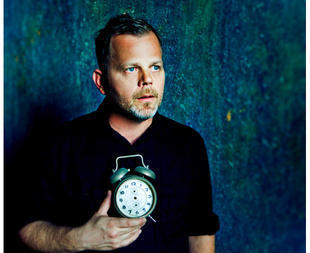 I once asked Ryan in an interview to describe his songwriting process. He responded by explaining that there really wasn't one; the songs crafted themselves. "It can get dangerously mystical talking about songwriting," he said, "but for me it's a form of meditation." Dangerously mystical. That seems like an oddly apt way to describe I Recall Standing, the way it grips your focus all the way through. A kind of hypnosis. You want a challenge? Put the album on and try not to listen. Just try.
I once asked Ryan in an interview to describe his songwriting process. He responded by explaining that there really wasn't one; the songs crafted themselves. "It can get dangerously mystical talking about songwriting," he said, "but for me it's a form of meditation." Dangerously mystical. That seems like an oddly apt way to describe I Recall Standing, the way it grips your focus all the way through. A kind of hypnosis. You want a challenge? Put the album on and try not to listen. Just try.








September 18, 2011
Harbach's Masterful Fielding
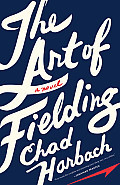 Chad Harbach's The Art of Fielding has as of today been released for just shy of two weeks but this book's been a large spot on the radar for awhile, as anyone who tried to finagle an ARC after the initial fifteen hundred ARCs were distributed. One's got to assume few debuts get an initial ARC run in four digits. Plus of course there was the news of the book's sale itself, the high six figures Little, Brown shelled out (all of this stuff is well covered in Keith Gessen's article in the latest Vanity Fair, which to this reader seems like the absolute easiest article to ever have been written in the history of ever: I like Gessen quite a bit, and I'm as into VF as the next guy, but seriously? You write a huge article [which'll be turned into an e-book for $1.99] on your friend, the co-editor of the magazine you work? For what it's worth: it's moves like those that get folks up in arms about MFAs and networking vs. artistic merit—I'm glad Gessen wrote the article, and I'm happy Harbach's getting the attention, but it's just…the whole thing's about as nepotistic as it comes). anyway: all the background info you need about Harbach's book's out there: The Art of Fielding has been the publishing of the story of the year so far.
Chad Harbach's The Art of Fielding has as of today been released for just shy of two weeks but this book's been a large spot on the radar for awhile, as anyone who tried to finagle an ARC after the initial fifteen hundred ARCs were distributed. One's got to assume few debuts get an initial ARC run in four digits. Plus of course there was the news of the book's sale itself, the high six figures Little, Brown shelled out (all of this stuff is well covered in Keith Gessen's article in the latest Vanity Fair, which to this reader seems like the absolute easiest article to ever have been written in the history of ever: I like Gessen quite a bit, and I'm as into VF as the next guy, but seriously? You write a huge article [which'll be turned into an e-book for $1.99] on your friend, the co-editor of the magazine you work? For what it's worth: it's moves like those that get folks up in arms about MFAs and networking vs. artistic merit—I'm glad Gessen wrote the article, and I'm happy Harbach's getting the attention, but it's just…the whole thing's about as nepotistic as it comes). anyway: all the background info you need about Harbach's book's out there: The Art of Fielding has been the publishing of the story of the year so far.
Regardless of whether the story of the book's birth and existence Matter or Last in any significant way is up to others to debate. What's for sure is that The Art of Fielding is one of the most satisfying, fantastic long novels to have been released in a long, long while. Harbach's clearly trying to take his place at the table alongside Franzen and the rest (worth asking: who exactly is the rest? I can't think of any who are working that Dickensian seam quite like Franzen: Eugenides, maybe, and Powers to a degree, but Wallace isn't quite part of that group, I'd argue, and ditto some of the other guys that used to be clumped in there [Moody, Antrim]). If you're looking for a book that will suck a solid weekend of yr life and offer all the essential and mesmerizing joys of fiction, this is your book.
Yes, to get the obvious and perhaps necessary stuff out of the way: Harbach's an n+1 guy, which, if you're into inside baseball, puts him in the post-Eggers, more serious milleu (someone should make flow-charts of how Wallace led to Eggers/McSwys let to n+1). Harbach's also the guy who wrote the awesome old article about how Franzen's The Corrections was the follow-up to Infinite Jest, an article which is necessary reading according to this reviewier. Also, through homage or whatever, Harbach's made a cast of characters which shares similarities with lots of Wallace—anyone who comes to Fielding with Jest in mind will notice all sorts of overlap (big and little things: chewing tobacco, surnames built around variations of the word light in various languages, a parallel between lead characters [Hal in Jest, Henry in Fielding]). Anyway, enough of the other shit: that's what a keen, score-keeping reader may wish to have acknowledged before entering the book.
But oh lord, what a book. Seriously, just such a book. I unfortunately recently read the latest Eugenides (who has his own Wallace-based issues), which I was expecting to be a big, satisfying novel with an immersive narrative world and etc (how could I not expect that, given Eugenides's past works?). I was massively let down by Eugenides, as I imagine most people will be, but I left the book just bereft, hurt that the book absolutely did not deliver on that rarest magic, the believable and sustained fictional world (there's really just a ton wrong with the new Eugenides).
So it was with that hellhound of disappointment on my ass that I dug into Harbach's door-stop last Friday, and I spent the day gladly on my back, getting up at 7pm feeling that wonderful, strange way one does on finishing a great book: thrilled that I'd been in the world, disappointed that I was now finished with the world. The story centers around Henry Skrimshander, a college short stop playing for Westish College, a fictional school on the coasts of Lake Michigan. Henry's an almost magically gifted short stop, a mistake-less monster on defense, and, at the book's start, we trace him moving quickly from high school through the first two years of college as he plays and works out, bulking up and becoming a hitter as well and, of course, playing the whole time without committing an error.
Henry's Fielding's bright sun, and it's strange: the characters which orbit him are, arguably, more fascinating and riveting than he is. There's Guert Affenlight (see what I mean about surnames and light?), Westish's president, a Melville scholar who gave up a faculty position at Harvard to return to Westish; there's Pella, Guert's drop-out, young-married daughter, who arrives at Westish and tries to start a new life (or pick up where her old one went off the rails); there's Schwartzy—Mike Schwartz—who is absolutely the heart and soul of this book, a year Henry's senior, the team catcher, habitual tobacco chewer…Schwartz is the reason, I'm guessing, most folks'll love this book; there is, finally, Owen Dunne, Henry's roommate, and Owen happens to be gay and who becomes involved in the relationship for which most readers'll feel most powerfully. There are other love relationships, one of which is fantastic, one of which will give you a stomach ache. There is, of course, Henry's fall from perfection: 164 pages into a 517 page book, Henry's errorless streak ends.
Henry's streak ending actually provides perfect insight into how badass Harbach is, for two reasons. First, Harbach lets the story just go: real early on in the book two full years of college pass in a matter of pages. This was, to this reader, jarring on coming upon them: it's too early in the book to fully understand the author's sense of pacing, sure, but two years in a matter of pages seems much. Turns out, however, that Harbach's doing exactly the right thing. Here's a sideways route to Harbach's badassery: the latest Colson Whitehead and Jeffrey Eugenides both move like stuck muck, so slow you'll find yrself flipping pages just because otherwise you'll pass the F out, and both make for terrible reading because of such speed—whole pages devoted to microdetails one finishes reading about only to be pissed, borderline hurt that one's been made to focus on something that feels trivial. Harbach's speed through such moments builds massive trust rapidly: not once, after that first two-years-in-a-blink blip, did I question his moves.
The second big reason to love Harbach and Fielding: the plot's just a fantastic zigging thing. You already know the big plot pivot point—that Henry eventually earns an error, and that that imperfection dogs him. But, again: that happens 164 pages in. You'll spend the rest of the book—350+ massively satisfying pages—wondering how things'll shake out, only very occasionally being able to see clearly the upcoming moves (and those moves you can see coming are fairly well telegraphed, meaning you'll actually get satisfaction from being able to see it coming and then seeing it actually transpire as imagined).
There's plenty else to love about this book—the writing's clean and open, feels in the best ways like the midwestern school and people the book's set in and with and around: the writing feels true, mostly without guile, mostly attempting to do both good and well. I can't think of a book that's gonna come close to this in terms of satisfaction, story, character, plot…it's gonna be awhile. You'll see.








September 14, 2011
1) I'm still writing for the Kenyon Review blog (and have...
1) I'm still writing for the Kenyon Review blog (and have poems in their upcoming fall issue), so the bulk of my online work's been directed that-a-way. Recent things: an interview with George Pelecanos and a long conversation with the fantastic Lily Brown about Wallace Stevens, an awesome interview with Alex Lemon which focuses much of its time and energy on baseball, a review of the stellar Just My Type by Simon Garfield. There was also a long, 2-part conversation with John Gallaher awhile back—can't remember if I noted it here or not, but there it is. Keep tracking the site—I'm there through October and will have, among other things, a review of one of the best infographic books in who knows how long, The Real State of America Atlas, plus hopefully a long interview with Richard Buckner about books and music.
2) New work: I've got something in the latest issue of Muzzle magazine, though the issue's chock full of far better shit than the absolute best I could possibly write. Also had a thing in the latest issue of MAYDAY, which is pretty okay too.
3) There've been a ton of books this summer that I haven't taken the time to review fully (plus music!) and now it's coming autumn again so I feel terrible and compelled to get bunches done. Expect short reviews for the next while, at least from me: there's a ton to wade through. A couple books demand long-form reviews—chad Harbach's The Art of Fielding is crazy good—but otherwise I want to just get things covered. Apologies to the books/authors for not being more thorough—and let's start now:
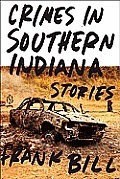 Crimes in Southern Indiana by Frank Bill. Did you hear about this book? You probably should have—the similarities to Donald Ray Pollock are striking (rust belt state author with blue collar life by himself cracks his own code and writes incredibly, plus for each man the writing's full of violence and brutishness), but that's not reason to hear about it—you should've heard about it because the book's fucking breathless, will knock you on your ass. I read the opening story, "Hill Clan Cross," while I ate lunch one day and had to stop reading—it wasn't ruining the meal, but I didn't want to divide my attention between sandwich and book. You want sentences that just haul ass? "Bonfire bent his knees to standing. Turned to Willie, whose taffy-pink palm reached for Bonfire's hand that held the .38, pressed his forehead into the heated barrel. His clouded eyes dug through Bonfire." I don't know what to call it—it's not straight noir nor pulp nor gothic, this writing and these stories, it's just good, and thick, and impossibly dark and moral and worth reading.
Crimes in Southern Indiana by Frank Bill. Did you hear about this book? You probably should have—the similarities to Donald Ray Pollock are striking (rust belt state author with blue collar life by himself cracks his own code and writes incredibly, plus for each man the writing's full of violence and brutishness), but that's not reason to hear about it—you should've heard about it because the book's fucking breathless, will knock you on your ass. I read the opening story, "Hill Clan Cross," while I ate lunch one day and had to stop reading—it wasn't ruining the meal, but I didn't want to divide my attention between sandwich and book. You want sentences that just haul ass? "Bonfire bent his knees to standing. Turned to Willie, whose taffy-pink palm reached for Bonfire's hand that held the .38, pressed his forehead into the heated barrel. His clouded eyes dug through Bonfire." I don't know what to call it—it's not straight noir nor pulp nor gothic, this writing and these stories, it's just good, and thick, and impossibly dark and moral and worth reading.
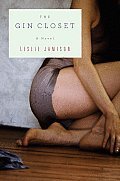 The Gin Closet by Leslie Jamison. Jesus, just read this. I don't know what to say—lots of the blurby stuff in the book features commentary on how the book's brutal and gorgeous, and I'd agree fully. I'd also say it's sadder by miles—real sad, in true ways—than anything I've read in awhile. I didn't see this one coming, and maybe you missed it too, but it's been out in paperback for awhile: get on this.
The Gin Closet by Leslie Jamison. Jesus, just read this. I don't know what to say—lots of the blurby stuff in the book features commentary on how the book's brutal and gorgeous, and I'd agree fully. I'd also say it's sadder by miles—real sad, in true ways—than anything I've read in awhile. I didn't see this one coming, and maybe you missed it too, but it's been out in paperback for awhile: get on this.








September 5, 2011
Evil!
The Science of Evil by Simon Baron-Cohen
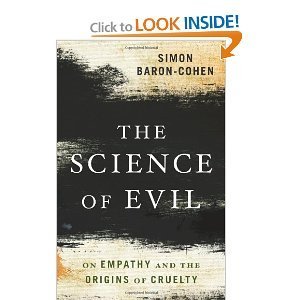 Some folks may recognize Simon Baron-Cohen (uncle of Sasha Baron-Cohen, better known as Borat) from his research into autism. Speaking very broadly, Baron-Cohen believes that the causes of autism are rooted in gender differences, namely the disparity between the degrees of empathy that either gender is capable of experiencing. Empthy is the key word here, because while the title of this book might suggest something of a more philosophical nature–think Sam Harris' The Moral Landscape–what you really have is a very cut-and-dry investigation into what empathy actually is, its neurological underpinnings, and what could happen when those underpinnings fail.
Some folks may recognize Simon Baron-Cohen (uncle of Sasha Baron-Cohen, better known as Borat) from his research into autism. Speaking very broadly, Baron-Cohen believes that the causes of autism are rooted in gender differences, namely the disparity between the degrees of empathy that either gender is capable of experiencing. Empthy is the key word here, because while the title of this book might suggest something of a more philosophical nature–think Sam Harris' The Moral Landscape–what you really have is a very cut-and-dry investigation into what empathy actually is, its neurological underpinnings, and what could happen when those underpinnings fail.
Interestingly, the author's theories regarding psychopathy–largely the focus here–stem from his research into autism. Baron-Cohen maintains that folks at the severe end of the autism spectrum and folks who fit the clinical definition of "psychopaths" are often joined by a lack of empathy. That is, they are unable to grasp the concept of others' feelings and wants. In some cases, this is "balanced out" by a greater-than-average propensity for systematization, as well as an ability to spot patterns that most folks overlook–what Baron-Cohen calls Zero Positive empathy, otherwise known as the autism spectrum–while other times this lack of empathy leads to a view of other people as "things" whose sole existence is to facilitate the wants and needs of the individual–what Baron-Cohen calls Zero Negative empathy, and which he says is a major cause of severe cruelty.
This is fascintating stuff for the armchair psychologist in most of us, though the writing itself could use some work. Not that most of us expect general-audience nonfiction to be necessarily Shakespearian, but we do usually expect some degree of style and fluidity that, in this case, just isn't here. And this in itself might not be a problem, were it not for the fact that it contributes to an oversimplification of many important concepts–for example, the very concept of "evil." Baron-Cohen addresses it at the beginning of the book and makes it clear that he believes the typical religious conception to be inadequate, but to attribute such a complex concept to little more than "a lack of empathy," as he does, doesn't seem much better. And yes, I realize that he's not writing some treatise on moral philosophy but rather a succint overview of a very complex psycho-biological matter. But it does seem that even this kind of work demands a more thorough investigation into what "evil" actually means, perhaps because of how easily a statement like this opens itself to so many fickle philosophical objections (Aren't people objects? Couldn't we say that we do, in fact, treat everyone like an object in some form? How are humans supposed to be treated?). Another part of it just that this seems to let "evil" off the hook a bit too easily; Baron-Cohen illustrates his conception of evil by referencing the Nazis, but there's something just a bit heartless and obtuse about implying that all the Nazis really did was treat people like objects.
 Still, this doesn't diminish the book's overall impact. At the end of the day, you still have a thoroughly scientific perspective on an issue that most folks are content to chalk up to a Michael Bayish notion of "good vs. evil." To look at concepts like cruelty with a scientific eye requires us to set aside some of our most long-standing beliefs. This is no easy feat, but at the very least, Simon Baron-Cohen provides us with a good entry point.
Still, this doesn't diminish the book's overall impact. At the end of the day, you still have a thoroughly scientific perspective on an issue that most folks are content to chalk up to a Michael Bayish notion of "good vs. evil." To look at concepts like cruelty with a scientific eye requires us to set aside some of our most long-standing beliefs. This is no easy feat, but at the very least, Simon Baron-Cohen provides us with a good entry point.








August 31, 2011
Stone Arabia Is or Is Not
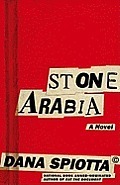 Taking in Dana Spiotta's Stone Arabia was a weird experience—not only was it hugely praised and hyped, but it was p'd+h'd in the immediate wake of Egan's crazily great Goon Squad, and since both books share some concerns—specifically music and questions and struggles regarding authenticity—I figured all the chatter must've meant that Stone Arabia was even better than Goon. Which, of course, maybe, was the wrong way to approach this book, because I thought Goon was one of the best books I've read in the last ten years and I'm guessing almost nothing will (to me) hold a candle in comparison for some time.
Taking in Dana Spiotta's Stone Arabia was a weird experience—not only was it hugely praised and hyped, but it was p'd+h'd in the immediate wake of Egan's crazily great Goon Squad, and since both books share some concerns—specifically music and questions and struggles regarding authenticity—I figured all the chatter must've meant that Stone Arabia was even better than Goon. Which, of course, maybe, was the wrong way to approach this book, because I thought Goon was one of the best books I've read in the last ten years and I'm guessing almost nothing will (to me) hold a candle in comparison for some time.
The essentials first: Stone Arabia features middle-aged Denise and her brother Nik, he a genius/recluse type—imagine Daniel Johnston without brain trouble, or imagine a sort of Chilton/Brian Wilson character. Nik at least capable of crafting great pop songs, and had a chance, in the late 70s/early 80s, to maybe have a shot at recording a record with a major label, though this should be made fully clear: Nik was never Some Next Big Thing, About to Blow. He was a local (this is all in Los Angeles) player who made compelling of-the-moment music and attracted label interest, and he chose, instead, to snub them for reasons that might be considered something along "artistic integrity" lines.
(I know this is all convoluted and dicey; trust me when I say the book's organization's similar).
Nik, 49 in 2004, the year the book's happening in (also the year of the Abu Ghraib photos), has spent his life making music for himself and chronicling a "fake" or "other" life—the Chronicles (one's got to assume a nod to Dylan [one of the odd bits of fun in Stone Arabia is tracking the little tells and nods toward other musicians, different legends]) each cover a year and in each Nik gathers the faked and manufactured evidence of this parallel life—one in which he's legendary, in which the records got made and were subsequently released for purchase and loved, in which his artistic genius is recognized. None of those aspects overlap with his actual real world life: he lives above a garage, works at a bar, is in shit health and getting worse from the drinking and smoking. He makes music, yes, but he burns individual copies for families and friends and he makes the sleeves by hand.
So, that's Nik. His younger sister, Denise, is the novel's narrator (though she's not: the book jumps from third to first person 28 pages in and switches back to third roughly the same at the book's end; a reader's sure welcome to ask why the switch but should be appraised this reviewer's got no satisfactory answer for the switch), and she's Nik's biggest fan. Biggest fan of his music, of him as a brother, and she'll come close to financial ruin to support him in his quest, in his attempt to live this very protected life (the only checks I remember her writing in the novel were those with horrific interest rates, those ones provided by credit cards). Denise and Nik's mother's memory's deteriorating, and Denise spends long stretches thinking about memory and aging and the slow demise and failure of the body. Also, Denise has a daughter, Ada, and a boyfriend, Jay, neither of whom ever come close to feeling like real characters (and, in fact, Jay feels worse than not real: he feels like a cruelty, a joke—he brings Denise Thomas Kinkade, Painter of Light™ gifts on their get-togethers, and the reader's again sure welcomed to wonder if these are given and received smartly ironically or what).
Again: apologies for how this is coming off. What's weird is that I'm glad I read Stone Arabia, and I'll be thinking about it for some time, but I'm not sure I liked it, nor am I sure it succeeded in doing the things I most enjoy books for doing. For instance: that third to first person switch 28 pages in? What happens is that Denise claims to basically be hijacking the narrative, which move is a sort of correlative with Nik's decision to hijack the narrative of his own life and craft the Chronicles. Okay, the reader's thinking, fine, there's resemblence and echo. Or: Denise is (like all of us, like who isn't) someone who spends her news-gathering and -reading time and energy skimming, surfing in lieu of going deep, but then she gets incredibly taken by the story of the prisoner abuse at Abu Ghraib and the story of tragedy befalling Amish communities. A canny reader might try to connect these characterization dots, find a way to fit the tragedies Denise is taken with and by into her life, yet even if you find space for them to connect, the question still hangs, as it does about the hijacked narrative thing above: Why is it being done?
Ultimately, Stone Arabia is a book about siblings and dreams, and it's great in exactly that capacity. However, Stone Arabia seems also to be a book that's trying to do several other more high-minded po-mo things, and it comes off, to me, as cold, as a miss. Please know: I love me some high-minded po-mo stuff, particularly in fiction—one of the reasons I so loved Goon Squad was because of the PowerPoint chapter, which I thought was as moving and gorgeous as anything I've seen in a long time. I can't remember feeling much moved, ever, by anything in Stone Arabia: the book ultimately feels more calculating than I enjoy my fiction to feel.
For what it's worth: I'll admit to having a hard time with fiction lately—I finished a bit back one of the fall's big anticipated novels and loathed it, felt it disconnected and causeless. Let me be real clear: Stone Arabia is, according to damn near everybody, a fine and powerful and stellar work of art. Perhaps. It is also, according to this reviewer, the story of middle-aged siblings trying to make their way and their peace with their lives, but that story's unfortunately bedecked with bunches of other asides which ultimately feel cutesy or insignificant or both. Still: read the thing. I'm probably wrong—seriously, everybody everywhere loves this book (you think I'm kidding? Check out five part this roundtable at EChampion's Reluctant Habits)








August 21, 2011
Parental Discretion is Advised
 I'm not usually one to get freaked out by a book. I think the last thing I read that truly frightened me was Stephen King's novella "The Mist," and that was when I was like fourteen.
I'm not usually one to get freaked out by a book. I think the last thing I read that truly frightened me was Stephen King's novella "The Mist," and that was when I was like fourteen.
So it's saying something that just a few nights ago I had a nightmare about Emma Donoghue's Room. Narrated by five-year-old Jack, the story–as the title suggests–takes place in a single room (for the first half, at least), in which Jack has spent his entire life, oblivious to the notion of a world outside, other than the bizarre images on his television–and even these he doesn't necessarily connect to any larger concept of Others. Jack shares the room with his Ma, who was imprisoned there years prior by Old Nick, a shadowy character whose late-night visits require Jack to hide in a cabinet so as not to be seen.
Most of my friends with children refuse to read Room, which I think is understandable. To be sure, the book is horrifying in a way that actual horror novels are not. There are no monsters or demons or wicked other-worldly creatures. In fact, for the first half of the book, there's really no one other than Jack, Ma, and Old Nick–that is, if you don't count the items in the room that Jack has come to view as petlike specimens (Stove, Fridge, Rug, Bed–you get the idea). Donoghue's treatment of the room as its own self-contained world–which it literally is to Jack–makes the story more palatable for readers, who might otherwise be turned off by the idea of reading a book with such strict setting parameters, while also reinforcing the sense of grim isolation.
Of course, the book is not without its flaws, though ironically many of these are the very same things that make it such a fascinating read. For instance, the voice: try to imagine a narrator who, aside from being five and obsessed with Dora the Explorer (who he doesn't intuitively realize is a cartoon), has never had any interaction whatsoever with anyone other than his mother. On one hand, you could make the argument that the story has to be told from Jack's perspective because the real impact rests in his obliviousness. But on the other hand, this lends itself to some overly cute narrative tricks, particularly once Jack and Ma have escaped (half the story takes place outside of the room, so I'm not giving anything away here):
"In the world I notice persons are nearly always stressed and have no time. Even Grandma often says that, but she and Steppa [Jack's step-Grandfather] don't have jobs, so I don't know how persons with jobs do the jobs and all the living as well. In Room me and Ma had time for everything. I guess the time gets spread very thin like butter over all the world, the roads and houses and playgrounds and stores, so there's only a little smear of time on each place, then everyone has to hurry on to the next bit."
 Jack's naivety, while largely responsible for the story's emotional impact, does begin to get a bit saccarine, too innocent to really carry the authority that a narrator needs. Still, I think this is forgivable, given the bravado required to write something so daring. Moreover, Donoghue skirts all of the psychological/legal thriller crap that would otherwise come along with such a book and instead sticks to the characters, Jack and Ma and the few figures we meet "Outside." It's a story as elegant as it disturbing, something that very few established authors in the horror and thriller genre(s) are able to pull off.
Jack's naivety, while largely responsible for the story's emotional impact, does begin to get a bit saccarine, too innocent to really carry the authority that a narrator needs. Still, I think this is forgivable, given the bravado required to write something so daring. Moreover, Donoghue skirts all of the psychological/legal thriller crap that would otherwise come along with such a book and instead sticks to the characters, Jack and Ma and the few figures we meet "Outside." It's a story as elegant as it disturbing, something that very few established authors in the horror and thriller genre(s) are able to pull off.








August 14, 2011
The Kids Aren't Alright
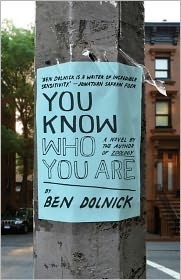 If you've been following along over the past couple months, then you know that I've been indulging a kind of pre-30 quarter-life crisis by focusing on books with adolescent/teenage protagonists. Sad and a little creepy? Yes. But a bit more rational than getting something pierced and going down to Buffalo Wild Wings to pick a fight (though I haven't those things out yet).
If you've been following along over the past couple months, then you know that I've been indulging a kind of pre-30 quarter-life crisis by focusing on books with adolescent/teenage protagonists. Sad and a little creepy? Yes. But a bit more rational than getting something pierced and going down to Buffalo Wild Wings to pick a fight (though I haven't those things out yet).
This time around, we've got Ben Dolnick's You Know Who You Are, a freakishly good read for fans of coming-of-age stories (except don't call them coming-of-age stories, not unless you write made-for-Tv flicks for Lifetime). Our protagonist is Jacob Vine, the youngest member of his ostensibly normal family–at least, as normal as any of us might hope. While Jacob begins the story as a child, the death of his mother and his relationship with a young woman from a well-to-do family catapult him into an uncertain adulthood, where he bumbles through the very common but nonetheless intriguing rites of figuring out just who the hell he is. Add to this an older brother–Will–whose transformation into a self-loathing theater geek provides a brillian contrast to Jacob's character, and you've got a crisp, well-crafted story with stunningly vivid characters.
To call Jacob the black sheep of the family, as the NYT's Nicholas Kulish has, might be an overstatement; sure, he's awkward and confused and his lack of impulse control is mildly disgusting, but no more than any other teenager. I suspect that what Kulish meant is that Jacob perceives himself as the black sheep, an outcast, a generally bad fit into any social system; at least this seems to be the case (his burgeoning rebelliousness is enacted in a wonderful scene involving middle school art classroom). To be sure, this is sort of the defining sentiment of the teen years, the secret desire to not be understood so that you may continue to complain about being misunderstood. And Dolnick nails this flawlessly.
What's most important here is that Jacob isn't a cartoon. None of the characters are (with the possible exception of Marick, a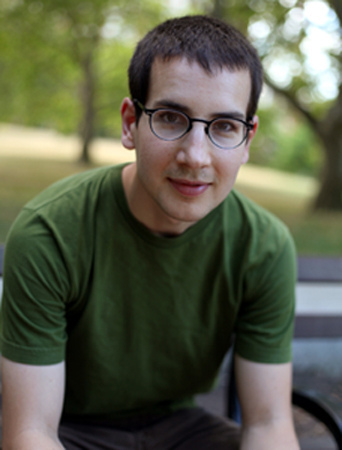 childhood friend of Jacob's). That's saying something for a book whose evocative power requires readers to revisit their own annals of pubescent discomfort, to laugh at the notion that they, too, were once people who trolled their parents' bookshelves for any illicit reading material that may have shed some light on the ominous matter of sex, and who once regarded school dances as legitmate social events. And still, never once does Dolnick settle for the cheap laugh, the gimmick, the schtick that makes books of this nature such a gamble. It's funny, sure, but not in that uber-charming David Sedaris way. Rather, You Know Who You Are is funny because, as nearly all of us have discovered from our own personal coming-of-age sagas, the only alternative is to throw up your hands and cry over the tragedy of it all.
childhood friend of Jacob's). That's saying something for a book whose evocative power requires readers to revisit their own annals of pubescent discomfort, to laugh at the notion that they, too, were once people who trolled their parents' bookshelves for any illicit reading material that may have shed some light on the ominous matter of sex, and who once regarded school dances as legitmate social events. And still, never once does Dolnick settle for the cheap laugh, the gimmick, the schtick that makes books of this nature such a gamble. It's funny, sure, but not in that uber-charming David Sedaris way. Rather, You Know Who You Are is funny because, as nearly all of us have discovered from our own personal coming-of-age sagas, the only alternative is to throw up your hands and cry over the tragedy of it all.








August 7, 2011
Further Updates + Elsewheres
Just for the record: CBooks has (geographically) moved this past year, in fact just this past month, hence the paucity and quiet. Things'll be coming back sortly, be appraised. Of course, the speed with which this place gets back to more regular posting depends a bit on where else time's being drawn with other work, of which there's been a bit lately. Meaning:
Still going strong at the Kenyon Review, with posts here and here (both basically reviews, with digressions).
I reviewed Paul Maliszewski's fantastic Prayer and Parable for the Mpls Star Trubine; I've been waiting for this book since 2003, and was thrilled to finally get the whole thing, and the review for the Strib's short because they've got word-counts to consider and everything, but, really, you should be reading this book pronto.
(Maliszewski's one of those 'experimental' writers whose work's fundamentally driven by non-character engines—the scenario, the world of the story, dictates the eventual shape of the story as much as anything else. In this he's lots like Helen DeWitt, whose Lightning Rods is coming this October and is fantastic. I'd be curious who else writes like this, this almost Borgesian way, in which schema/systems are as critical for book movement and heft as anything else [Barthelme, obviously, too][Danielewski's great in HoL, and, sure, his other stuff's systems-based, but don't pretend it's good writing—he's gone so far that the system/rules now dictate everything; reading him feels like listening to someone sing individual notes with perfect clarity for exactly 1 minute at a time and expecting thunderous applause for technical mastery].)
For what it's worth: Blake Butler's done some amazing stuff recently at HTMLGiant, not least putting up his submission list from 2006-2008. I'm personally interested in such a thing because 1) I like Blake and his work and 2) it was through a submission that I met the man. I have nothing exciting or sexy to say about what he posted, but when it went up I felt like it was just so fucking yes I didn't know where to begin. Maybe this: Blake's one of the younger writers it seems like lots of folks talk about, at least right at present this year, and I happen to mostly loathe some of the other younger writers getting press lately, and Blake's response to people giving him attention seems one of the most generous and good things he could possibly do: he showed the work involved, what things too, the costs. Way too many younger writers are convinced that there's some magic involved in securing an agent and a pub deal and etc., and I'm sure there are folks who've had different experiences, but shit is it a good public service of Blake to put up exactly how many submissions it took him—in just a two year period—to get to where he's now got. If more writers owned up to this I think we could demystify the shit out of the whole snarky business (and I'll note that this post is ironic in the extreme given Blake's earlier piece: one'd think that writers should be those least inclined to flex any jealousy muscles, given that we all know the fucking insane amounts of work that go into getting things out and published. I'll also submit that the line "Poets are the most jealous type of artist" might be the single fucking stupidest sentence I've read in a year, if not more).









